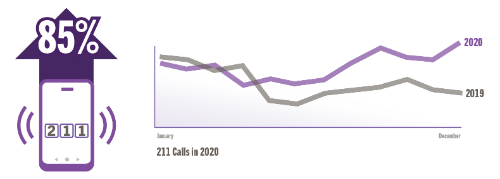Weber State Tracks COVID-19 Effects on Weber County Residents
The COVID-19 pandemic has impacted nearly every aspect of life in the United States, from healthcare to the economy to domestic violence rates, including in Ogden City and Weber County.
Weber State’s Center for Community Engaged Learning Research Extension (CCEL-RE), an office created to meet data and research needs of community partners and nonprofit organizations, launched an online dashboard to provide a better picture of exactly how  the pandemic has impacted residents of Weber County. The dashboard features charts and graphs with data regarding hospitalizations, unemployment rates, evictions and more.
the pandemic has impacted residents of Weber County. The dashboard features charts and graphs with data regarding hospitalizations, unemployment rates, evictions and more.
“More than 500,000 people in the United States have died, and some kids have been out of school since March 2020, learning virtually,” said Katharine French-Fuller, CCEL-RE director. “We need to have a comprehensive understanding of how this is impacting our community.”
Weber State researchers plan to update the dashboard monthly and insert new data as it becomes available. They hope to soon add a heat map to show eviction rates by location in the county.
CCEL-RE collects information from a variety of sources, including government agencies and nonprofit organizations. Much of the data shows a severe impact on women and people of color.
“We have aggregated the data for hospitalizations and COVID-19 cases by ethnicity, gender and language spoken by the patient, and all of that helps us understand the inequity,” said Yesenia Quintana, data and community research coordinator.
.png) As the dashboard went online in February, females had a higher number of total COVID-19 cases (13,208) than males (12,157). Compared to residents who identify as white, residents who are American Indian or Native Alaskan were four times as likely to be hospitalized due to COVID-19, while Hispanic/Latinx residents were three times as likely to be hospitalized.
As the dashboard went online in February, females had a higher number of total COVID-19 cases (13,208) than males (12,157). Compared to residents who identify as white, residents who are American Indian or Native Alaskan were four times as likely to be hospitalized due to COVID-19, while Hispanic/Latinx residents were three times as likely to be hospitalized.
Cassandra Backman, a researcher for the project, said displaying the impact on the area can show residents how it affects them more than they may think. “Sometimes, when we hear national and state statistics, we tend to think ‘that’s not impacting us.’ By providing a dashboard that encompasses our local community, it brings reality to people’s eyes,” she said.
The team was surprised at some of the findings. The data revealed that August 2020 was a particularly difficult month, with increased reports of domestic violence. Calls to 211 and evictions skyrocketed during the month as well. Since June, the Eden/Huntsville/Liberty municipality has had the highest per capita rate of COVID-19 cases in Weber County.
While the dashboard helps show which areas and populations have been hit the hardest, it doesn’t explain how those issues were caused. Researchers hope local agencies and academics will use the data to discover ways to help find solutions to the difficult issues that residents are facing.
Visit weber.edu/wsunews for more news about Weber State University.
For graphics, visit the following links.
wsuucomm.smugmug.com/Press-Release-Photos/2021-Photos/March-2021/i-kpzKPMk/A
wsuucomm.smugmug.com/Press-Release-Photos/2021-Photos/March-2021/i-M9vHhG3/A
wsuucomm.smugmug.com/Press-Release-Photos/2021-Photos/March-2021/i-4jwgZ3f/A
Jaime Winston, Marketing & Communications
801-626-7396 • jaimewinston@weber.edu- Contact:
Katharine French Fuller, Center for Community Engaged Learning - Research Extension director
801-626-7631 • kfrenchfuller@weber.eduYesenia Quintana, Center for Community Engaged Learning - Research Extension coordinator
801-626-7824 • yeseniaquintana@weber.edu